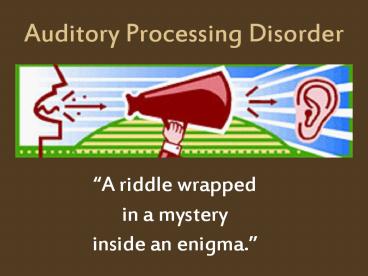Auditory Processing Disorder - PowerPoint PPT Presentation
1 / 18
Title:
Auditory Processing Disorder
Description:
Auditory Processing Disorder A riddle wrapped in a mystery inside an enigma. What is Auditory Processing Disorder? A term used to describe a wide range of ... – PowerPoint PPT presentation
Number of Views:930
Avg rating:3.0/5.0
Title: Auditory Processing Disorder
1
Auditory Processing Disorder
- A riddle wrapped
- in a mystery
- inside an enigma.
2
What is Auditory Processing Disorder?
- A term used to describe a wide range of
disabilities in which there is some impairment in
the brains ability to process auditory stimuli
and interpret it in a meaningful way.
3
(No Transcript)
4
The IDEA Act defines Auditory Processing disorder
as a disability that causes problems in
comprehending the social and interpersonal
content of languagestemming from the fact that
the disability makes it difficult to separate
communication from background noise.
5
Some Characteristics
- Difficulty understanding spoken language in
competing messages, noisy backgrounds, or
reverberant environments - Difficulty maintaining focus on an activity if
other sounds are present
6
More Characteristics
- Misunderstood messages
- Inconsistent or inappropriate responses
- Frequent requests for repetition
- Difficulty with long conversations or multi-step
directions - Difficulty with reading, spelling or other
learning
7
Incidence
- From 2-3 to 7 of the population
- Twice as prevalent in males than in females
- Most widely diagnosed in children and the elderly
8
Potential Causes
- The cause is often unknown, but it could be
- Genetic
- Tumor
- Head trauma
- Viral infection
- Degenerative disorder
- Lead poisoning
- Oxygen deprivation
9
Accommodations/Modifications/Strategies
Environmental Modifications
Signal Enhancement Strategies (including
assistive technology and instructional strategies)
Auditory Training
10
Environmental Modifications
- Simple modifications
- Installing carpets
- Curtains
- Seals on doors
- Rubber shoes on doors
- Architectural interventions
11
Instructional Modifications
- Repetition
- Rephrasing
- Slowed speech
- Shortened speech
- Emphasis of key points
- Increased response time
- Visual aids
- Multimedia reinforcement
12
Assistive Technology
Auditory training software
Assistive Listening Devices
13
Assistive Listening Devices
- Assistive listening devices are used for hearing
improvement in large area listening situations
made more difficult due to noise, distance, and
reverberation.
FM systems The teacher speaks into a microphone
which transmits the sounds to the childs ear
through a receiver the child is wearing.
14
Auditory Training Software
15
Earobics
- Intended to improve phonological, attention, and
memory skills
16
PHONOMENA
- Used to improve auditory discrimination
17
Geared toward improving auditory and language
processing abilities
18
Community Resources
- internet communities for parents
- CAPD Parents Page
- Adults with CAPD































